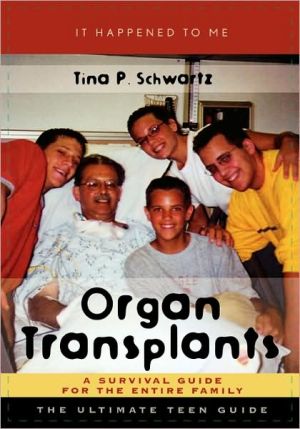

 |

|

The average rating for Organ Transplants based on 2 reviews is 4 stars.
Review # 1 was written on 2017-07-29 00:00:00 Sarah Sterling Sarah SterlingThis is a one-of-a-kind book that addresses the issue of what it's like to be involved with an organ transplant procedure. It's filled with real-life stories of teens whose parents, siblings, or other family members are transplant recipients as well as teens who have had transplants themselves and includes stories of recipients who have received heart, liver, kidney, pancreas, and double-lung transplants. This book describes the physical and emotional ups and downs that are part of the transplant process. It addresses, from both the recipient's and family's point of view, what it feels like to be placed on the transplant list, to wait for an organ, to receive "false alarm" calls to come to the transplant center, to finally undergo the transplant operation, to recover, to deal with setbacks of surgery and organ rejection, and to live on anti-rejection drugs the rest of one's life. Also detailed are the medical, financial, mental, and other preparations that must be undertaken as part of the transplant process. Guidance on what to expect, how to help, where to seek assistance, and how to support the patient is also given. Answers to the tough practical and emotional questions that teens have about an organ transplant, such as will my parent survive the surgery, how long will it take for my parent to recover, and why is this happening to me are discussed? Numerous question-and-answer sections of frequently asked questions about organ transplants and the myths that surround them are included, as well as contact information for organizations that provide many forms of assistance for recipients and their families. Through all the serious issues, however, this book offers much hope and promise for recipients and their families through the stories of those whose lives have been greatly improved through an organ transplant. This is the ideal resource for all readers who are interested in the subject of organ donation and transplant, including those who are facing a transplant and their family members as well. see this and more than a hundred other organ donation/transplant related books - many with my personal reviews - at |
Review # 2 was written on 2014-04-21 00:00:00 Martin Pope Martin PopeEveryone needs to be their own advocate for their health care. A good first step is to understand how doctors think, and that's what this book attempts to do. The book generally focuses on the problem of incorrect diagnoses. Following each example of incorrect diagnosis there is an analysis of the reasons why the errors were made. Then the authors suggests ways doctors and patients can avoid similar problems in the future. There are numerous ideas and suggestions for patients to use in improving their chances of being correctly diagnosed. Generally speaking my reaction to most of the examples in the book was that the docors are human, and they can slip up occasionally. The book suggests that doctors are correct about 85% of the time. (Incidentally, that's about the same rate of accuracy as modern weather forecasting.) What I was most alarmed to learn about was how inaccurate radiologist and pathologists were. After hearing the accuracy rates for those professions, I think it to be unwise to allow a serious operation be performed based upon the test results reported by a single radiologist or pathologists. The author is a doctor himself. One of the most interesting examples in the book was his own personal story of finding a solution for pain in his right hand. I lost count, but I think he visited about six different specialists trying to find a solution to the problem. I noticed that his wife, who's also a doctor, insisted on coming along to some of the visits with doctors to make sure her husband would ask the corrrect questions. He used his medical connections to get in to see what are considered to be the top experts in the nation, and even he was unhappy with the way he was treated. If he wasn't happy, imagine what happens to the rest of us. In the end he had a surgery done that gave him 80% full use of his hand, a bit short of perfection. However, if he had gone forward with about 4 of the 6 proposed operations, the result would have either been no improvement or maybe ending up in a worse condition. The following is the review from my PageADay Book Lover's calendar: Nobody's perfect, not even your doctor. But most doctors get most diagnoses right most of the time. Jerome Groopman, Harvard Professor of Medicine and essayist for The New Yorker, examines those times when things go wrong. The questions Groopman asks are crucial: What assumptions do doctors make about patients that lead to misdiagnoses? And what can you, the patient, do to help your doctor think clearly and avoid fatal jumps to conclusions? This is one book that can definitely improve your health. |
CAN'T FIND WHAT YOU'RE LOOKING FOR? CLICK HERE!!!